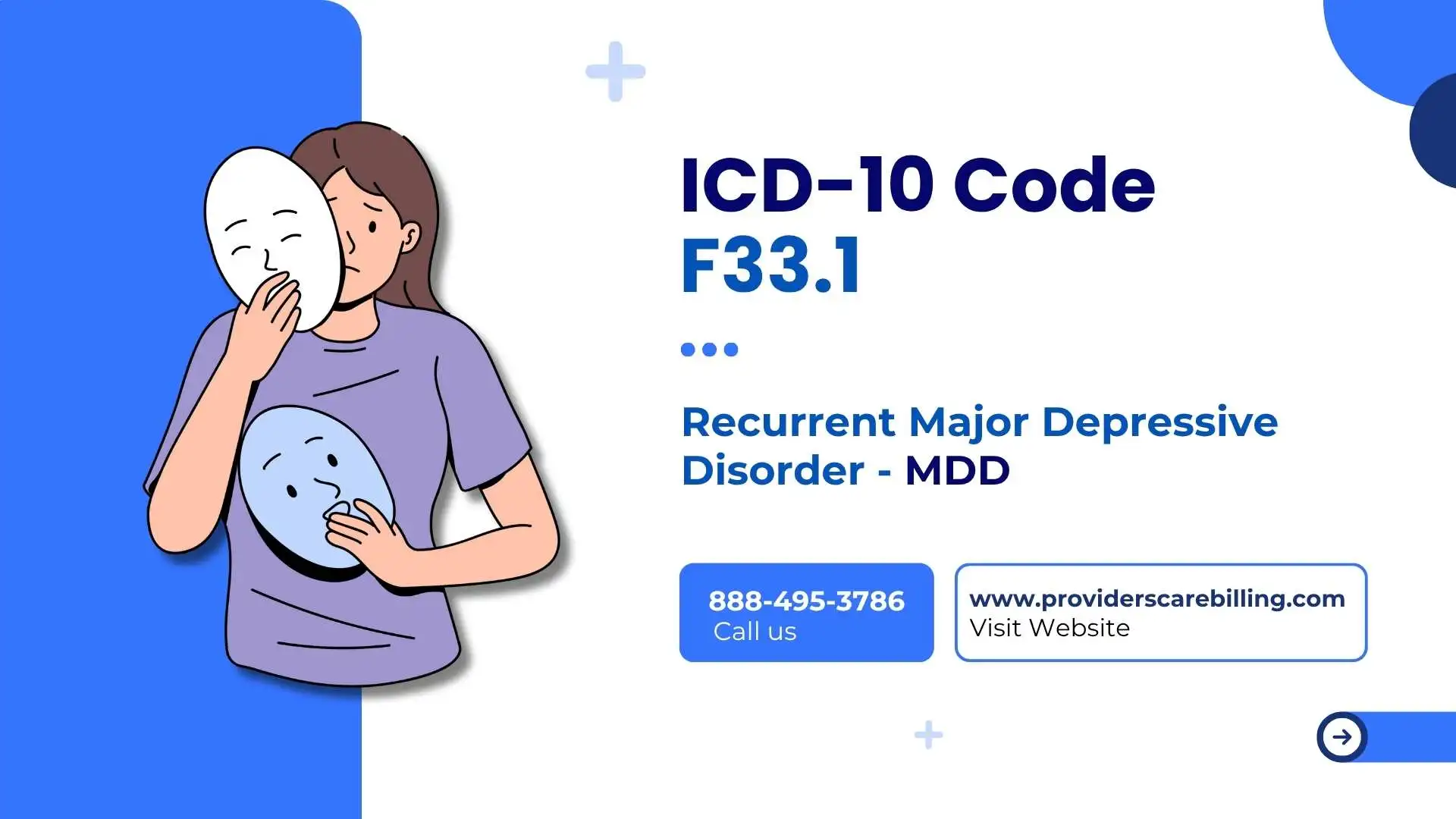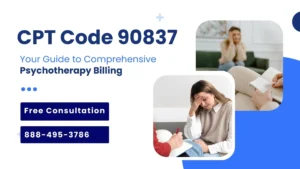Did you realize that more than 280 million people throughout the world live with depression, as reported by the World Health Organization? The incidence of MDD is measured in millions of patients yearly, for the USA alone. It should be clear why accurate medical coding is important — maintaining the integrity of patient records, ensuring that patients are correctly treated, and generating accurate reports, which ensures that reimbursements are made properly. However, there is one final reason that often gets overlooked and taken for granted. The F33.1 is one of the most common diagnosis codes for Major depressive disorder, recurrent episode, moderate.
This F33 tutorial will take you inside the F33.1 ICD-10 Code. Learn the clinical details and documentation requirements of this ICD-10 code in a helpful code chart that takes you from the code to the code description and associated diagnosis rules, and straight to the needed documentation and billing tips. At the end, you will have a strong understanding of what to do to create efficient processes in your practice, but be able to address the most common mistakes.
Understanding the F33.1 ICD-10 Code
The F33.1 ICD-10 code is utilized for the reporting of recurrent episodes (moderate). It’s in the F code for depressive disorder, of which there are several depression-related diagnoses.
A recurrent episode is a period of depression that has occurred more than once, with an interval of at least two months without any appreciable mood or other symptoms. The concept of “moderate’ concerns the severity of this episode, where the patient struggles to operate on a daily basis, albeit not as severe as under a major or severe diagnosis (e.g, MDD recurrent severe ICD-10).
Diagnostic Criteria for F33.1
In order to properly utilize the ICD-10 code for major depressive disorder recurrent episode, an individual clinician should confirm that a diagnosis falls within certain legal bounds set out by definition manuals such as the DSM-5. The following are some of the main criteria for major depressive disorder, recurrent episode, ICD-10, moderate.
· The patient has suffered from 2 or more MDEs.
· At least five of thefollowingw symptoms must occur for at least two weeks, at least one of which is a core symptom (depressed mood or anhedonia):
· Persistent sadness or hopelessness
· Lack of interest or pleasure in activities
· Changes in weight or appetite
· Sleep disturbances
· Fatigue or low energy
· Impaired concentration
· Thoughts of worthlessness or guilt
· Psychomotor agitation or retardation
· Suicidal thoughts
To make the differentiation between MDD recurrent moderate ICD-10 and MDD recurrent severe ICD-10, symptoms have to be evaluated and documented with more care.
Mental health diagnoses often overlap; for example, many patients with depression may also struggle with trauma. Learn how PTSD (F43.10) is diagnosed and coded in our PTSD ICD-10 billing guide.
Documentation Guidelines
The F33.1 must be a well-documented diagnosis code. Without proper documentation, insurances may not be filed, claims may not be paid, and patient care may suffer.
Some of the things that you will need to keep a record of:
Past History: Past episodes of depression and treatments.
Chief Complaint: Describe quality, severity, duration, and any relation to the patient’s health.
Plan: Record whether and which medications, therapy, or interventions have been prescribed.
Supporting Information: Indicate any associated medical condition or external cause that could have influenced the diagnosis.
Thorough documentation is important in order to not only code correctly, but to ensure a clear plan of care for the patient.
Billing Guidelines for F33.1
ICD 10 code for major depressive disorder, recurrent billing is often complicated; however, best practices can simplify it and minimize claim denials.
Here’s a step-by-step guide to billing the F33.1 ICD-10 Code correctly
Use the Appropriate Code: Verify that the diagnosis corresponds to the code. For a recurrent moderate episode, make sure you have F33.1 and not another subtype.
Documentation is Key: Insurance companies can be overly critical of claims for mental health services. Ensure documentation demonstrates medical necessity.
Comorbidity, if it exists: If the patient has other mental or physical illnesses, include additional ICD-10 codes to get a complete picture of the patient’s health.
Common Billing Challenges
· Partial Documentation: Omissions in documentation may result in claim denials.
· Misleading severity: Clearly differentiate moderate from, e.g., severe.
· Late Submission of Claims: Claims should be submitted in a timely manner to avoid processing delays and non-compliance.
Real-Life Example of Successful Coding
Dr. Patel, a mental health provider, recently treated a 38-year-old patient with a diagnosis of b. Using the F33.1 diagnosis code and she recorded symptoms, treatment plan, and history of previous episodes in detail. That way, the insurance claim went through without any hiccups and was processed on time. The patient’s insurance reimbursed the clinic promptly for psychotherapy sessions and antidepressants prescribed.
This case demonstrates the importance of correct coding and documentation, ensuring the best care for those under one’s care and prompt payment.
The Most Common Billing Mistakes and How to Prevent Them
Errors in billing for the diagnosis code of depressive disorder are frequent, yet preventable.
Here are pitfalls to look for and tips to avoid:
Errors
· An incorrect severity code (e.g., mixing up F33. 1 with F33. 2 for severe episodes).
· Failure to capture comorbidities that affect billing.
· No basis in the literature of other cases similar to this has occurred.
Solutions
· Make sure your billing team understands the subtleties of ICD-10 codes.
· Verify the accuracy and appropriateness of records on a regular basis.
· Coordinate with a medical billing specialist to minimize errors and maximize reimbursements.
Feedback from Healthcare Providers
“Our claims approvals are up over 30% since we started with Providers Care Billing LLC! Their ability to code difficult diagnoses such as MDD recurrent moderate ICD-10 has been immensely helpful in our practice.”
Shawn T. Mental Health Clinic Owner
“Correct coding is so important for operating a successful business, nd Providers Care Billing has been a game changer. No one pays attention to detail like they do.”
Family practice office manager Lisa M.
Work with the Medical Billing Experts
Correct documentation and application of the F33.1 ICD-10 code are vital to the financial and operational viability of practice settings. Why take the chance of getting unnecessary denials when expert help is a click away?
About Us: Providers Care Billing LLC, a USA Illinois-based company, is a professional provider of complete medical billing and coding services. With an impressive 4.9-star review with 100% client satisfaction and one of the most competitive rates available (only 2.89%), they can help you save time on your billing process and increase your bottom line.
Don’t wait, Put Providers Care Billing LLC to work for your business today!
FAQs About F33.1 ICD-10 Code
Q1: What is the difference between F33.1 and F33.2?
A: F33.1 is prescribed for recurrent moderate depression, while F33.2 is prescribed for recurrent severe depression and any mental health disorder with psychotic features.
Q2: Can a first depressive episode use F33.1?
A: No, F33 codes are for recurrent episodes. A first episode would fall under F32.x codes.
Q3: What are the reimbursable treatments under this code?
A: Treatment may involve counseling and psychotherapy, and medications like SSRIs, “if they’re in the treatment plan that’s been documented.”




